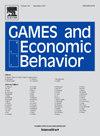Ideological consistency and valence
IF 1
3区 经济学
Q3 ECONOMICS
引用次数: 0
Abstract
We study electoral competition between two win-motivated candidates, considering that voters care both about the valence and the ideological consistency of the competing candidates. When valence asymmetries are not too large we find a unique pure strategy Nash equilibrium in which (i) platform polarization (i.e. the distance between the candidates' policy proposals) is solely determined by the strength of preferences for consistency, and (ii) the expected policy outcome may move to the right as the valence of the leftist candidate increases. When valence differences are large, a mixed equilibrium emerges: the high-valence left-wing candidate chooses a moderate right policy and the low-valence right-wing candidate responds, usually, with an extreme right position and, occasionally, with a moderate left one. Our analysis provides novel insights regarding candidates' flip-flopping incentives, and parties' motives to nominate low-quality candidates.
意识形态一致性与效价
考虑到选民关心竞争候选人的价值和意识形态一致性,我们研究了两个获胜动机候选人之间的选举竞争。当效价不对称不是太大时,我们发现了一个独特的纯策略纳什均衡,其中(i)平台极化(即候选人政策建议之间的距离)完全由一致性偏好的强度决定,(ii)预期政策结果可能随着左派候选人效价的增加而向右移动。当价差很大时,就会出现一种混合均衡:高价位的左翼候选人选择温和的右翼政策,而低价位的右翼候选人通常会选择极端的右翼立场,偶尔也会选择温和的左翼立场。我们的分析提供了关于候选人反复无常的动机以及政党提名低质量候选人的动机的新颖见解。
本文章由计算机程序翻译,如有差异,请以英文原文为准。
求助全文
约1分钟内获得全文
求助全文
来源期刊

Games and Economic Behavior
ECONOMICS-
CiteScore
1.90
自引率
9.10%
发文量
148
期刊介绍:
Games and Economic Behavior facilitates cross-fertilization between theories and applications of game theoretic reasoning. It consistently attracts the best quality and most creative papers in interdisciplinary studies within the social, biological, and mathematical sciences. Most readers recognize it as the leading journal in game theory. Research Areas Include: • Game theory • Economics • Political science • Biology • Computer science • Mathematics • Psychology
 求助内容:
求助内容: 应助结果提醒方式:
应助结果提醒方式:


